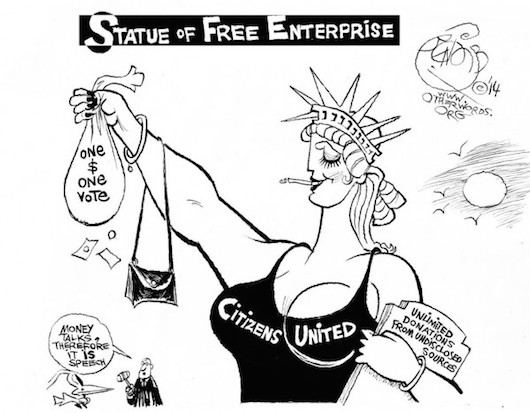The 2014 midterm elections sure looked like a blowout for the Republican Party. But leave it to The Daily Show with Jon Stewart to call the real winner: big money.
“Incredible night for money in politics!” gushed one of the show’s satirical correspondents.
Indeed, in the first national elections since the Supreme Court’s McCutcheon v. FEC decision (aka Citizens United) — which removed overall federal limits on contributions to political candidates and party committees — the tidal wave of special-interest spending was even heavier than the most dire predictions.
The “Money Midterms,” as some commentators dubbed them, were the most expensive in history. Local news stations struggled to keep up as they were flooded with ads from super PACs and other outside groups.
The Daily Show is right: The most enduring “winners” in the midterms may be the wealthy interests that bankrolled their candidates of choice and can now expect to have the ears of their chosen representatives.
A tiny fraction of the electorate drove this deluge. As of Oct. 15, just 140 donors had provided more than 60 percent of this cycle’s super political action committee (PAC) contributions. That’s no surprise in a post-Citizens United landscape where corporations and billionaires can spend as much as they want to influence elections.
But it’s not all bad news on the money in politics front. Despite this influx of money — or perhaps in some cases because of it — the 2014 elections also brought a number of hopeful signs that the tide is rapidly turning.
In Florida, Tallahassee voters passed a referendum to cap political contributions in local elections at $250 per donor, among other measures. In Maine, more than 1,000 volunteers collected signatures in support of a ballot initiative to update the state’s clean elections law. Cities across Wisconsin passed referendums against Citizens United. And in Maryland, Republican Larry Hogan will be the first governor of that state to have accepted public financing for his campaign.
And that was just on Election Day.
In September, Atlanta’s city council overwhelmingly passed a resolution in support of a constitutional amendment to overturn decisions like Citizens United, joining more than 550 other towns and cities across the country. In the same month, activists from across the nation made over 15,000 calls to Senate offices backing an amendment to let Congress and the states set reasonable limits on money in elections.
Even during the “Money Mid-Terms,” some politicians took note of this swelling movement. This cycle, we saw candidates from both major parties making campaign finance a theme of their campaigns, reacting to the fact that the push for change is coming from Americans of all political stripes.
The fight to take our elections back from the chokehold of wealthy special interests won’t go away. Americans know that as long as the system is rigged, it’s not going to work for anyone except those doing the rigging.
Anyone who was subjected to the endless barrage of political ads and emails this cycle knows that political spending is out of control. That’s why we’re fighting alongside committed activists around the country to amend the Constitution to overturn decisions like McCutcheon and Citizens United and reclaim our democracy.
The more Americans speak out and challenge their elected officials to take action to address our money in politics problem, the more campaign finance reform will become a pivotal issue that every candidate will have to address in future elections.
So while the 2014 elections exemplified everything wrong with our campaign finance system, they also demonstrated how we’re going to make it right: through the power of ordinary Americans.





